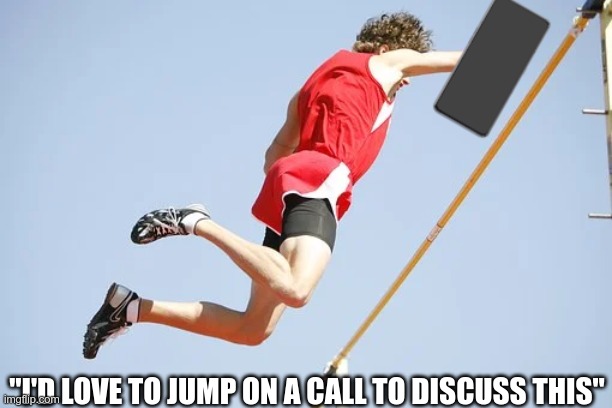As a proud card-carrying curmudgeon, misanthrope, and writer (united as one in the form of a socially isolating freelance writer), I thought that the moment had finally come to sound off about some of the most annoying corporate expressions that I have become acquainted with this year.
In fact, the inspiration for this post was my first Reddit meme which, at the time of writing, has eleven upvotes.
Without further a-do.
“Could You Jump On A Call?”
Could there be anything that better exemplifies the nonsensical nature of most corporate jargon than asking somebody about “jumping” on a call.
Where to? On the phone itself? Probably a bad idea. Up and down while on the spot while I listen to your sales pitch? I really don’t have the energy.
The following is the mental image which forms in my head whenever I hear this phrase uttered.

Put it in writing. Schedule a Zoom call if needed.
But I’m not “jumping” on it. And certainly not now.
Corporate jargon: Hi Daniel! Awesome to reach you today! Care to jump on a call to hear about how our CRM could change your life?
Real communication: Hello Daniel. I’m mildly excited to learn that I finally got though to you but will not be feigning any more enthusiasm. Would you like to buy our CRM? If so, I would like to get you on a call where I can more easily sell you on why you should do so. Because I type too slowly and I like phone calls.
“Make Sense?”
I owe an apology here to my wife and in-laws. The first is American by birth. The latter live there. But surely no nation on earth has done more to invent and propagate senseless corporate jargon than the American people. It’s American cultural imperialism at its worst, I tell you.
Sadly, Israelis (I live in Israel) have an obsession with emulating American culture — and its business etiquette. The unfortunate consequence of this is that the latest and greatest American jargon of the season gets imported here wholesale about once a year. Whether it arrives by Netflix or by corporate interactions I don’t know. But it makes it here somehow.
Don’t take my (grumpy) word for that, though. I got all scientific just for this blog post and searched my inbox while drafting this article. My methodology was as follows:

Having briefly perused the results which it yielded, I can confirm two things:
a) This phrase is almost entirely uttered in the corporate world
b) The worst offenders are Americans and American expats
Why do I hate “make sense?” so much?
It’s usually on the trailing end of some instruction.
And, for me, it carries the subtext: “were you intelligent enough to follow that, dearest simpleton, or would you like me to explain that in greater detail?”

Apparently many are not so nonplussed by this phrase.
Which I guess proves that language is a personal thing and that everybody interprets it differently. Through their own prism. Their own [substitute your preferred color] thinking.
Make sense?
“I’ll Have You Do X”

Another arrival from across the Atlantic appears to be the saturation of people telling others, in the corporate world, that they will “have somebody do X” (it could be you!)
Does this even count as corporate jargon? Pet peeve? Either way, it’s earned a place on this list.
Here, again, I flaunt my curmudgeon credentials: this one really doesn’t sit well with me.
People are autonomous. In hierarchical structures, people do indeed “have” others do something. The imperative tense exists in language for a reason.
But there’s something about the baldness of talking about “having” another human do something that, to me, smacks too closely of notions of (literal) servitude.
My recommended substitution is to “ask” another party to do something — even if both parties need to suspend their disbelief at the idea that the person on the receiving end of the communication has any volition that matters.
Doing so pads the imperative through the gentle frame of a request which can be suffixed with “please” and other such niceties. It more comfortably upholds the mirage that the junior staff member / intern / clerical worker has some semblance of free will left about his or her workflow and tidily creates the fiction that they retain the prerogative to turn down your request. Because nobody likes to acknowledge that they’re basically just there to execute their boss’s will.
Yes, this is euphemism for the sake of being euphemistic. But it shields one slightly from the harsh realities of the world. Just enough to be comfortable. And isn’t that what all manners are about ultimately?
Weird corporate language: Hi Daniel! I’m going to have you write up that press release today.
Potential substitute: Hi Daniel! Do you have time to work on that press release today? If so, I’d like you to do so. I’d like you to have it ready in five minutes, in fact. Make sense?
“Reaching Out”

When I first overheard somebody talking about “reaching out”, I constructed a grand mental image for what this might entail.
Were we trying to get in touch with some nomadic Amazonian tribe who had only recently procured a satellite phone (but decided that they needed to retain our services)?
Perhaps we had landed the International Space Station (ISS) as an account and needed to “reach out” beyond the confines of the stratosphere to establish contact?
Much to my dismay, neither of these things were true.
Instead, “reaching out” has emerged as a ubiquitous and vapid substitute for “contacting” somebody.
The reason I, and many, dislike “reaching out” so much is that it carries overtures of some grand, almost philanthropic gesture. Which is almost always inaccurate.
Reaching out to establish contact with some lost desert tribe is one thing.
But is sending a marketing lead an unsolicited communication to sell them something really worthy of being called “outreach” at all? I’ll leave that rhetorical at that.
Corporate communication: Hi Daniel! Awesome to finally get through. I’m David from [Insert Prefix] CRM. And I’m here to ask you about you track your sales pipeline?
Real communication: Hi Daniel. I’m David from [Insert Prefix] CRM. I’m contacting you to see if you want to buy our system.
“Let’s Come Up To 30,000 Feet”

Differentiating somewhat logical but annoying corporate speech from truly unnecessary jargon is more difficult than it might appear at first glance.
For instance, I’m not a huge fan of the expression “deep dive” (sample usage: “let’s use this paragraph to take a deep dive on the consumer functionality”).
But is it ultimately any more logical than discussing something “in depth”?
Both expressions draw an analogy between physical depth — the state of being underwater— and non-literal depth of thought.
It makes sense even if, by dint of mindless repetition (including by the author) it takes on, over time, the feeling of somewhat cringeworthy business jargon.
However, when it comes to “coming up to 30,000 feet” or “the view from 30,000 feet” I have a harder time making sense of things.
Why 30,000 feet? What’s wrong with 20,000 feet? Or 40,000 feet?
Perhaps the cruising altitude at which domestic flights usually fly was choosing for its slightly more “grounded” — excuse the pun — feel than 40,000 feet, the altitude at which one would probably travel long-haul, might convey.
One must retain an ear to the ground in order to truly see the blue sky ahead, after all.
“High level” is already jargony enough but at least it says something reasonable — differentiating one’s explanation from those “drills” presumably hammering away down below.
Why do we need to define the altitude from which we will be making our observations about the lowly denizens below — with their drills burrowing into the deeper material below and their magnanimous emails “reaching out” to prospective clients across continents?
Business jargon is equal parts wildly entertaining, incredibly infectious, logic-stumping confusing, and, ultimately, totally infuriating.
Suffused with equal parts patent nonsense, inappropriate metaphor, and sheer rubbish, it has driven many a writer mad — particularly when the great force of osmosis forces them to begin using that same jargon subconsciously.
Consider substitutes to some of the above — for your sake and that of your recipient(s). Before I have to write another angry post about this on Medium.
Speaking of which, feel free to reach out to your friends sharing this. Some blue sky thinking can never go amiss after all.
Make sense?


